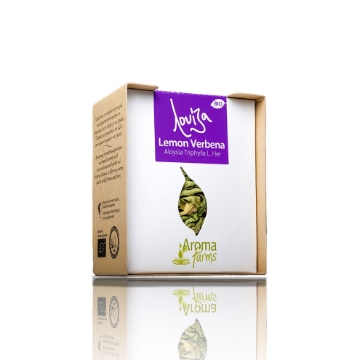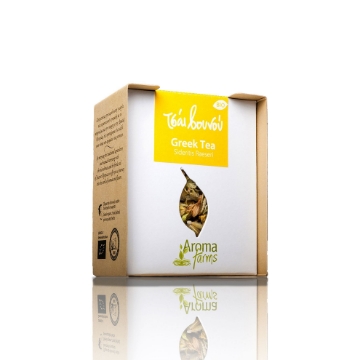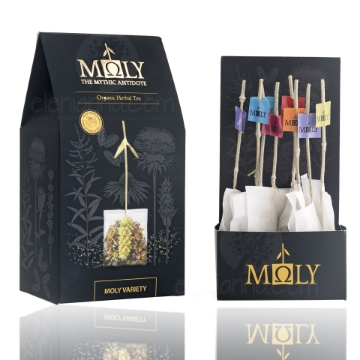
Ancient Greek Herbs
In Homer’s epics The Iliad and The Odyssey (800 BC), 63 plant species from the Minoan, Mycenaean and Egyptian Assyrian pharmacotherapy were referred to. The Chinese, Indians, Egyptians, Romans, and Arabs also relied on herbalism, which was assimilated into the philosophical principles, traditions and practices of their culture. Consequently, therapeutics developed from being empirical and instinctive to being magical and theocratic. The theocratic viewpoint constituted an element of all ancient civilizations, including the Greeks, until the advent of the Hippocratic School, which was based on observation and experiment. Hippocrates himself (late 5th century BC) mentioned 300-400 medicinal plants, classified by physiological action. He considered them the base of medical science, praised their therapeutic qualities and employed them in his everyday practice. Theophrastus (371-287 BC), Plato’s and Aristotle’s Student, famous philosopher and herbalist, continued Hippocrates’s work and recorded 500 species of Greek herbs, pinpointing the relaxing and empowering properties of various herbal tea flavors. Plant-derived therapeutic oils are mentioned on clay findings of cuneiform writing (2600BC) in Mesopotamia, while about 30 medicinal plants are mentioned in the Bible. In Dioscourides’ work De Materia Medica (1st century AD), herbal medicaments are described, providing the knowledge for most of the later medicinal preparations.
The great empires controlled the medicinal plants’ production and trade for centuries, while in the Middle Ages, their cultivation in abbeys and monasteries facilitated the development of knowledge on their therapeutic properties. During the Ottoman Empire, many Orthodox monasteries established hospitals within their premises, where remedies were prepared from medicinal plants cultivated by the monks. In a monastic script of this period in the island of Cyprus (1571-1878), 494 herbal descriptions and 231 plants belonging to 70 different botanical families were described. In Greece, for centuries, a large part of the native population health problems was encountered by empirical doctors, such as the renowned “Vikoyiatroi” of the Zagori region in Epirus (17th-19th century), who collected and used medicinal plants from the nearby Vikos Canyon. Eventually, with the advancement of modern medicine, traditional remedies were gradually abandoned in the developed world.
Aromatic herbs, however, are nowadays being re-examined, their extracts are thoroughly studied and their properties are revised, in an effort to complement or replace the existing synthetic chemical substances used in the modern food and industries. It is estimated that up to four billion people (representing 80% of the world’s population) living in the developing world rely on herbal medicinal products as a primary source of healthcare. In Africa, up to 90% and in India up to 70% of the population in rural areas depend on traditional herbal medicines to meet their health care needs. The use of herbal medicines has also become widely embraced in many developed countries, such as in Europe, North America, and Australia. In 2003, the percentage of the population that had used them at least once is 48% in Australia, 70%in Canada, 42% in the United States, 31% in Belgium and 49% in France. In the United States in 2007, about 38% of adults and 12% of children were using some form of traditional medicine. In the European Union alone, it is estimated that around 100 million people are using traditional herbal medicines. In these developed countries, the most important among many other reasons for seeking herbal therapy is the belief that it will promote healthier living.
Aromatic herbs have also become and constitute a fundamental element of the Greek cuisine, known for combining different elements wisely, with a unique sense of proportion and equilibrium. Without oregano, thyme, sage, and savory, many Mediterranean dishes lose their inmost qualities. Because of the many herbs used on a daily basis, there is no one herb that defines Greek cooking. Greek cuisine is all about enhancing the natural flavors of the products. In this respect, herbs are the very best way to add flavor and texture, without adding fat or calories and at the same time, increase the health benefits of foods one already enjoys. People use herbs to cut back on sodium intake, as less salt is used to flavor a meal. As Hippocrates (4th century BC), the great Greek physician, father of medicine, has wisely said: “Let food be your medicine and medicine be your food”.
According to one study, “intake of herbs (such as oregano, thyme, sage) may contribute significantly to the total intake of plant antioxidants and be an even better source of dietary antioxidants than many other food groups, such as fruits, berries, cereals, and vegetables”.
The Mediterranean weather provides one of the best conditions for the growth of herbs, in Greece. These beneficial plants have been known for centuries and used both in cooking; for their flavors, as well as in medicine, for their healing properties.
The Greek territory provides an ideal environment for herbs, which are found flourishing on mountain slopes and green fields.
Although the list of local herbs is endless, we have picked some of the lesser-known ones and included them on this list.
These are some of the most powerful Greek herbs list and greek medicinal herbs to include in any diet.
Summer Savory
Summer Savory or Greek Throubi is a perennial plant of the Mediterranean usually used in cooking. Ancient Greeks also used to make flavored wine with this herb.
During the Middle Ages, this herb was used to heal sore throats, coughs, and toothaches.
In modern herbal medicine, throubi greek herb is mainly used for its healing properties of the digestive system. It also stimulates the appetite and helps in the treatment of diarrhea, bowel spasms, pain from colic, and nausea.
It can also be applied externally as an antiseptic on wounds and insect bites, offering immediate relief.
Oregano
Oregano is maybe the most commonly used herb in Greek Cuisine, in soups, stews, with meat and fish, and of course, no Greek “Horiatiki” salad worth its salt, is without oregano.
In Ancient Greece, it was believed to encourage good luck and good health and symbolize joy. Oregano was planted near homes to ward off evil spirits and when worn on the head during sleep, encouraged psychic dreams.
Mint (Menta)
Greek myth has mint being named after Minthe, a water nymph, who drew the attention of Hades, God of the Underworld, when Persephone, his wife learned of this, she turned Minthe into a herb.
Mint is excellent, in the form of tea, for indigestion, nerve disorders, dizziness, sore throats, coughs, headaches, and insomnia.
Mint is used in many Greek dishes; Greek mint is of superior quality, both aroma, and flavor, owing to the rich soil and the warm temperatures of Greece.
Rosemary
The Latin word for rosemary, Rosmarinus, means “Dew of the sea” as it is said the plant emerged, alongside Aphrodite (Venus) when she rose up from the sea.
Ancient Greek students wore wreaths of rosemary, to aid memory.
A member of the mint family, rosemary is thought to be an antiseptic, to purify the blood
Mint is beneficial for asthma and breathing problems, as well as relieving headaches and indigestion.
Rosemary goes particularly well with roast meat, especially lamb.
Sideritis, (Greek Mountain tea)
The name is derived from the word iron, (Sideron), and in ancient time was used to heal wounds caused by iron weapons, such as arrows and swords.
Hippocrates prescribed it as a tonic; it is one of the most popular herbal teas in Greece.
Sage (Latin Salvia) (Faskomilo)
Ancient Greeks believed Sage warded off death and brought about immortality, or, a long and healthy life.
Greek physicians praised it so much, that it inspired the Romans to name it salvia, meaning; saving lives.
Sage is thought to lower cholesterol, enhance memory and soothe skin irritations and inflammation.
It’s quite a strong-tasting, pungent herb, and is used primarily with mild, bland tasting foods.
Chamomile
In Greek, the word chamomile means apple of the ground, so-called for its fresh apple scent and its low-growing nature.
Hippocrates was the first to mention chamomile and recommended it for purification, protection and to fight colds.
Chamomile tea is well known for its properties as a sedative, a relaxant, as an aid for sleep and for stomach disorders.
Thyme
Τhyme, in Ancient Greece, was as a source of courage, and was used as incense and infusions for bathing, and, to flavor liqueurs and cheese.
Placed beneath a pillow, in sachets, it was said to aid sleep and ward off nightmares.
Women gave it to warriors before they headed off into battle; it was placed on coffins to ensure a safe passage into the afterlife.
Thyme is one of the few herbs which will retain all its flavor when dried and is one of the herbs used in Bouquet Garni, a bundle of herbs, tied together and used to flavor savory dishes.
Oil of thyme is an effective mouthwash and antiseptic. As a tea, it helps coughs and bronchitis.
Greek herbs online and Greek herbs mix here






